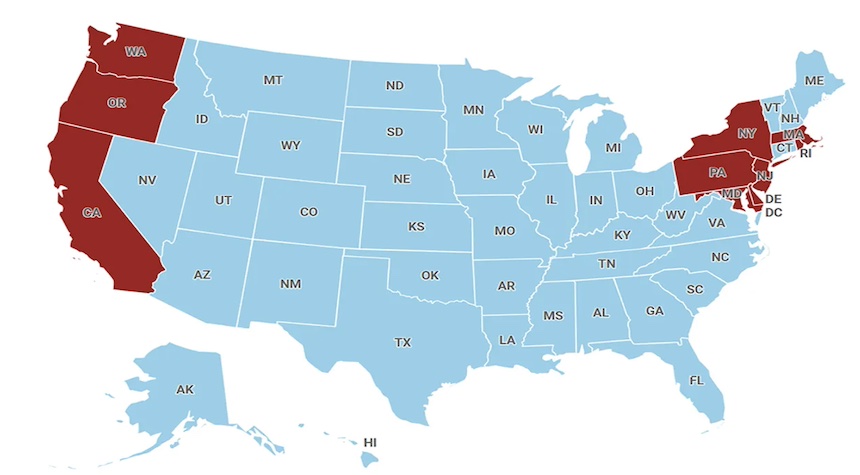As part of a climate change initiative, nine states plan to ban the sale of new gasoline-powered vehicles by 2035.
California’s Air Resources Board created the Advanced Clean Cars II regulations. California’s regulations aim to phase out new gas cars starting with the 2026 model, and then gradually reduce the number of vehicles until 2035 when the ban will be in place.
Eight other states have adopted the same rules since 2022 when California first adopted them, and several more are considering it.
Washington, Oregon New York New Jersey Rhode Island Massachusetts Delaware, and Maryland are the states that have so far implemented the plan for zero gas-powered vehicles sold by 2035.

These rules don’t stop people from driving gas-powered vehicles or owning them. Nor do they force customers to purchase electric vehicles. Dealerships in these states are still allowed to sell gas-powered cars, and consumers can buy gas-powered cars in other states as long as the vehicles meet certain emission standards.
This effort is not supported by everyone.
Last year, the New Jersey Business and Industry Association led a campaign to stop New Jersey from adopting the Advanced Clean Cars II Rule.
Ray Cantor is the NJBIA’s chief deputy government affairs officer. He said that the plan does not consider the costs to consumers or the lack of infrastructure.
Cantor stated that the ban on gas-powered vehicles in such a short time frame did not consider costs or feasibility. Cantor said, “It doesn’t take into consideration the lack of local highway infrastructure or costs.” Grid capacity is not taken into consideration. It does not consider consumer choice. It does not take into consideration New Jersey residents, particularly low- and medium-income families. It doesn’t consider the fact that there is no actual environmental benefit.”

Cantor called on New Jersey to “apply brakes” and stop what he called a “bureaucratic excess” before it starts to impact consumers.
Cantor stated that there was nothing wrong with reducing carbon emissions. Cantor said that the market would have seen a natural rise in EV users, with a timeframe to build up appropriate capacity. The near-term mandates, however, will raise the price of new and used gasoline-powered vehicles.
Terry Gray, Director of the Rhode Island Department of Environmental Management, has praised the new rules as a “major move” in the fight to combat climate change within the transportation industry.
Gray stated that “in terms of economic impact,” states working together to send a strong signal to the market would result in economies of scale. This will drive down the price of ZEVs, or zero-emission cars, and ensure Rhode Island dealers and their customers have access to electric cars.
As part of the administration’s climate agenda, the Biden administration is pushing the transportation industry to move from gas-powered cars to electric vehicles.

The Environmental Protection Agency (EPA), which is the federal agency responsible for regulating vehicle emissions, announced last year that it would be increasing its standards to include cars manufactured in 2027-2032.
The White House predicted that if the EPA regulations are finalized by 2032, 67% of all new car, crossover, SUV, and light truck sales could be electric. The White House also projected that up to 50% of bus, and garbage trucks, 35% of short-haul, and 25% of long-haul freight tractors could be electric.
The push for EVs is not without its setbacks.
Hertz’s CEO Stephen Scherr resigned earlier this month after its big bet on EVs failed due to the company’s struggles to keep pace with the increased repair costs and lower demand for EV rental.
Ford Model’s EV division posted a $4.7 billion net loss last year, with $1.6 billion in the last quarter. Ford’s Chief Financial Officer John Lawler said during the company earnings call held last month that “challenging market dynamics and investments made in next-generation cars” were to blame for the losses.

